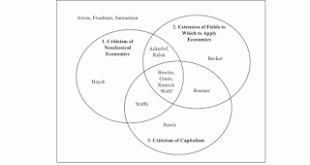Marx is mostly right. That is the conclusion one should draw from capital theory. But honestly understanding how we are fed, clothed, and housed under capitalism is not what academic economics is about. Ownership of property in, say, the United States results in the generation of income. This income takes the form of interest on debt, dividends, capital gains, rent, and so on. Many of those who are among the most wealthy often have returns to property ownership as their only source of...
Read More »Marx’s Theory Of Value Is Consistent With And More General Than Marginalist Economics
1.0 Introduction One inspiration for this post is stumbling across this abstract 2.0 Marx Start with labor coefficients and a Leontief input/output matrix, in physical terms. You can construct this from make and use tables for your country, given price indices by sectors. For any existing capitalist economy, I expect that matrix to characterize a more than viable economy. After all the capital goods used up in producing the final demand in, say, a year are reproduced, some commodities...
Read More »Where Can I Read Correspondence Between Robinson And Sraffa?
I have been looking at Sraffa's archives. Scott Carter was responsible for putting them online, as I understand it. Anyways, I know some contents has been published. What should I read for transcripts of letters between Robinson and Sraffa? Maybe something by Marcuzzo? Anyways, here is a 18 June 1960 letter from Robinson to Sraffa (D3/12/111: 340-341) All the work that I have been doing the last 10 years has been very much influenced by you – both our conservations in old days and by...
Read More »A Fixed Capital System That Is Or Is Not Interlocked
I have defined patterns of switch points in considering perturbations of examples of the choice of technique. For example, I have defined three-technique and four-technique patterns. An obvious extension is to consider how these patterns arise in models of joint production. A simplification is to only consider models of fixed capital without superimposed joint production. This post lays out an example in which, maybe, some parameter values can lead to a three-technique pattern. I am...
Read More »A Bowles Taxonomy For Economists
[embedded content]Katzner, Bowles, and Resnick on UMass Amherst Shartly after about 32:30 minutes, Sam Bowles, to laughter, draws a Venn diagram on the board. This is a light talk, and Bowles is explicitly describing economics from his own experience at the University of Massachusetts at Amherst. Bowles places various economists in various subsets. I have varied the names a bit in my reproduction below. Bowles' Taxonomy I take the universe to be the set of all economists. Or, maybe,...
Read More »Economics Of Race And Other Economics For Others
Do economists have anything to say about racism in the United States? Some do. The Review of Black Political Economy, for example, exists. Other groups in the United States are often thought of as marginalized. I have written about women in economics before. As usual, I want to mention the existence of the International Association for Feminist Economics and their journal Feminist Economics. I also note the existence of Queer Economics: A Reader for those economists that might be of a...
Read More »Some Positions Some Take On Sraffa’s Book
This post lists some views on Production of Commodities by Means of Commodities: A Prelude to a Critique of Economic Theory. The quantity flows Sraffa takes as given are those observable in an actual economy at a given time, as with a snapshot (Roncaglia 1978). These quantity flows, on the contrary, are at the level of effectual demand (Garegnani 1990). These quantity flows are for an economy in a self-replacing state. The assumption of constant returns to scale is necessary for drawing...
Read More »A John Eatwell Lecture
[embedded content]John Eatwell On Why Economists Disagee I like the above lecture by John Eatwell. He concludes by talking about the partial equilibrium model of supply and demand "that we teach, and we justify it by the general equilibrium model". He notes that lots of economists put imperfections in. The Arrow-Debreu is currently the fundamental model of price theory among mainstream economists. According to Eatwell, economists fall into at least five groups. Those who think revisions...
Read More »A Letter To Sraffa Long Before Google
At this time, the book had long ago been published by Cambridge University Press. I suppose I ought to review whatever conditions exist on transcribing stuff in the archives. The following is D3/12/111:9. Routledge & Kegan Paul Ltd. October 15th 1969 Professor Piero Sraffa, Trinity College, CAMBRIDGE Dear Professor Sraffa, At the Frankfurt Book Fair last week, Einaudi told me about your "Produzione di merci a mezzo di merci". I don't know whether this has been published in...
Read More »Extracts From LBJ Announcement Of The Appointment Of The Kerner Commission
My fellow Americans: We have endured a week such as no Nation should live through: a time of violence and tragedy. For a few minutes tonight, I want to talk about that tragedy - and I want to talk about the deeper questions it raises for us all. I am appointing a special Advisory Commission on Civil Disorders. Governor Otto Kerner, of Illinois, has agreed to serve as Chairman, Mayor John Lindsay, of New York, will serve as Vice Chairman... The Commission will investigate the...
Read More » Robert Vienneau: Thoughts Economics
Robert Vienneau: Thoughts Economics

